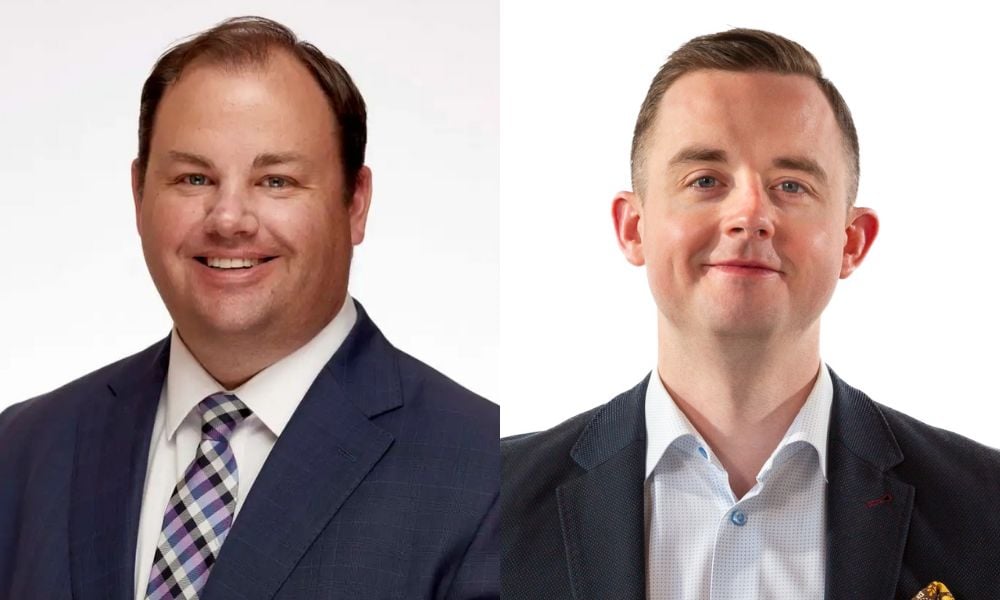Pressure from CFRs and enhanced total cost reporting hold promise for better client and advisor experiences, say leaders

As the Canadian wealth space faces new waves of regulation, firms and tech providers will have an opportunity to elevate their game, according to two leaders in the industry.
“The client focused reforms came into effect in 2021,” said Brent Allen, head of Strategy and Business Operations at IG Wealth Management (pictured above, left). “It's a good time for regulators and CIRO, the new amalgamated regulator, to go out and take a look at how firms are implementing the regulations.”
Earlier this month, the Canadian Securities Administrators (CSA) and Canadian Investment Regulatory Organization (CIRO) published the results of a national review of firms relating to the CFRs.
Focusing on material conflicts of interest, it uncovered deficiencies such as inadequate policies and procedures related to conflicts (found among 66% of firms examined), failure to identify one or more material conflict (34%) and inadequate controls to address such conflicts (28%). The CSA set out specific examples of conflicts it viewed as material, as well as suggestions on how to comply with their obligations.
“I'm expecting a number of broad and specific recommendations from the regulators,” Allen says. “We can always learn from feedback on how the industry is doing.”
The CSA and CIRO are also conducting reviews later this year to assess how the industry is complying with other obligations under the CFRs, including KYC, KYP, and suitability determination requirements. The ongoing regulatory scrutiny will be a challenge to navigate not just for IG Wealth, but also its wealth technology providers.
Two years ago, IG Wealth partnered with CapIntel, a sales enablement platform, to equip its team with a streamlined way to comply with the then-incoming CFRs. Together both companies have been dedicated to helping the other reach their respective business goals—including staying ahead of compliance changes.
“As audits happen, we can be open and reactive as needed,” says James Rockwood, founder and CEO of CapIntel (above, right). “But also, how can we be proactive? How can we continue to evolve our own roadmap so that we’re ahead of regulators’ expectations, while tightening existing relationships today?”
Beyond the CFRs, Allen has his eye on the enhanced total cost reporting (TCR) rules unveiled by the CSA and the Canadian Council of Insurance Regulators in April. Under those rules, firms will be required to show clients annual reports showing all the ongoing costs they pay – in dollars and in percentages – to own mutual funds, ETFs, scholarship plans, and segregated funds by December 31, 2026.
In response to the CFRs and TCR rules, Allen says it’s important for firms like IG Wealth to develop portals for clients with transparency on performance and price, as well as the holdings and the quality of their investments.
“When clients start to get that information, we want them to have a comprehensive view of not just what they’ve paid, but also the value they’ve received over that time,” he says.
“Because investment products are intangible, technology can have an outsized impact on helping make these products feel real for retail investors,” Rockwood adds. “The right technology can help the advisor articulate the value and the rationale behind their investment recommendations.”
As regulations continue to evolve past the CFRs, Rockwood says, technology will also need to advance to help advisors stay productive and minimize the impact of changes to their workflow.
“How do we make sure that more rules don't mean more administrative work for advisors? How do we ensure that advisors get more time to spend with clients, which is what clients will want as well?” he says. “That's really where I think we see the opportunity in the long term.”
Further into the future, Allen says it will be crucial to give clients a 360-degree view not just of their investments, but also their overall financial plan. For IG Wealth and CapIntel, he says, that will require much tighter collaboration.
“What I see in the future is a deeper relationship and integration between us and CapIntel,” Allen says. “We’ll be able to bring that information to clients in a secure and seamless way through trusted APIs … We’ll have the ability to show investment holdings and performance at the individual client or household level, so they’ll be confident the investments they’ve chosen will help them achieve their financial goals.”



